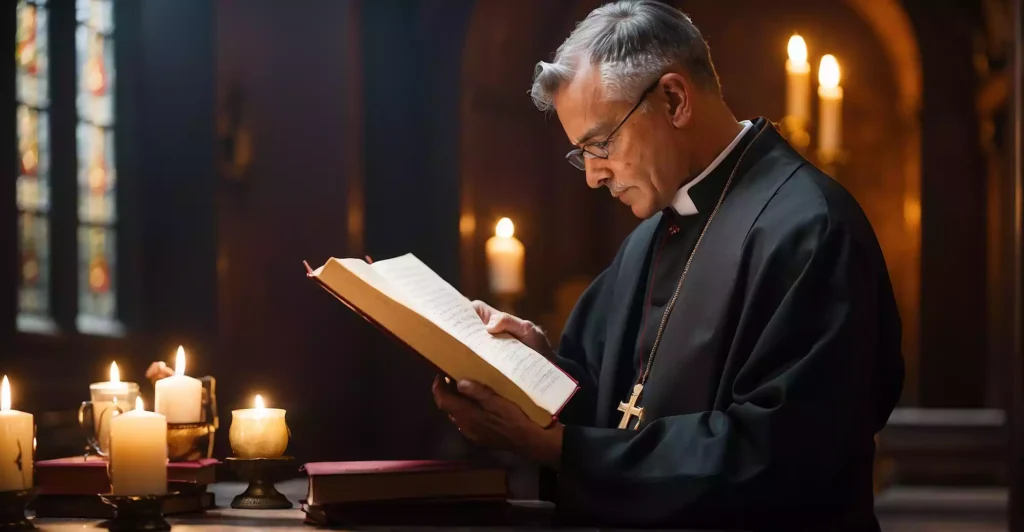Summary
Have you ever heard of the list of 150 Psalms And have you wondered about their history? These ancient songs express the essence of prayer and intimacy with God through centuries of history. Originally, the Psalms were sung poems accompanied by musical instruments such as the harp and lute, and they have roots that go back to the Jewish oral tradition.

Summary of the 5 books on the Psalms
| Book | Psalms | Features |
|---|---|---|
| First | 1-41 | Emphasis on God's kingship and sovereignty. Hymns of praise and thanksgiving, psalms of lament and supplication. |
| According to | 42-72 | Focused on the figure of King David. Hymns of praise for God's salvation and protection, psalms of lament and supplication. |
| Third | 73-89 | Addresses the issue of evil and suffering. Expresses confusion and sorrow in the face of the world's injustice, offers hope and trust In God. |
| Fourth | 90-106 | Dedicated to the history of the people of Israel. Celebrates the great works of God, offers lament and repentance for the sins of the people. |
| Fifth | 107-150 | Invitation for praise and thanksgiving to God. Celebrates God's greatness and mercy, offers teachings on life and faith. |
History of the Psalms
I Psalms were composed over a long period, going back as far as 1,000 B.C., and attributed for the most part to King David, the singing ruler of Israel. But not only that: in the collection we find traces of different authors, eras, and styles, reflecting the richness and complexity of the life of faith. They have been collected and brought together in the book we now know over several centuries, and their purpose is to provide words for prayer ranging from the highest praises to the most desperate laments.
🎯 Key Points
- The Psalms are songs of praise and prayer from the Jewish tradition.
- Composed by various authors, they date back as far as King David.
- They reflect universal themes and an extended time frame.
How the Psalms are divided
How it is structured exactly the list of Psalms? The book of Psalms is divided into five sections, similar to the five books of the Torah, reflecting different stages of Israel's history and various spiritual themes. Each section ends with a doxology, a short formula of praise to God.
Here is how they are broken down:
Book One (Psalms 1-41)
- This book is characterized by a strong emphasis on God's kingship and sovereignty.
- Many psalms in this book are hymns of praise and thanksgiving to God.
- Also found are psalms of lament and supplication, in which the psalmist turns to God for help and protection.
Book Two (Psalms 42-72)
- This book focuses on the figure of King David, considered the ideal model of the king of Israel.
- Many psalms in this book are hymns of praise to God for his salvation and protection.
- Also found are psalms of lament and supplication, in which the psalmist turns to God for help and guidance.
Book Three (Psalms 73-89)
- This book addresses the issue of the problem of evil and suffering.
- The psalms in this book express the psalmist's confusion and sorrow at the injustice of the world.
- Also found are psalms of hope and trust in God, who is seen as the only one who can bring justice and salvation.
Book Four (Psalms 90-106)
- This book is dedicated to the history of the people of Israel.
- The psalms in this book celebrate God's great works on behalf of his people.
- Also found are psalms of lament and repentance, in which the psalmist confesses the sins of the people and asks forgiveness to God.
Book Five (Psalms 107-150)
- This book is an invitation to praise and give thanks to God.
- The psalms in this book celebrate God's greatness and mercy.
- Wisdom psalms are also found, offering teachings on life and faith.

In addition to this division into books, the Psalms are also categorized by genre and function, such as:
- Psalms of Praise: they express the greatness of God.
- Psalms of Thanksgiving: out of gratitude to God for his blessings.
- Psalms of Wisdom: offer teachings on righteous living.
- Royal Psalms: concerning the monarchy and the kingdom of God.
🎯 Key Points
- The book of Psalms is divided into five books.
- There are different types of Psalms.
- The Psalms are used for various religious occasions and ceremonies.
How to read the Psalms
Reading the Psalms can be a transforming experience, but how should we approach these ancient and profound texts? First of all, it is essential to approach the Psalms with an open heart, seeking to understand the historical and cultural context in which they were written.

The Psalms speak to the human condition in all its facets: joy, sorrow, confusion, anger and love. To read them is to enter into an age-old conversation between man and the divine. You can use the Psalms as personal prayers, adapting their words to your own circumstances, or meditate on them to find comfort and guidance.
🎯 Key Points
- Approach the Psalms with a receptive heart and open mind.
- The Psalms address the full range of human emotions and situations.
- Use them as personal prayers or for meditation.
Why read the Psalms
And now we come to the why read the Psalms: These texts are more than just poems; they are a guide for the heart and soul. They teach us to pray with every emotion, to seek God in joy as in despair. Reading the Psalms can help us find words for feelings we struggle to express; they can be a balm for the wounded soul and a source of inspiration for deeper faith.
The Psalms are also a bridge between various faiths and cultures, testifying to the human search for contact with the sacred. They have been quoted in literature, music and art and continue to influence contemporary culture in surprising ways. Moreover, they offer a picture of spiritual life that is dynamic and rich, full of struggle, passion and hope.
🎯 Key Points
- The Psalms provide a language for prayer and emotion.
- They cross cultures and are relevant in various artistic contexts.
- They reflect a rich and dynamic spiritual life.
Complete List of 150 Psalms
Psalms 1-10
- Psalm 1: The way of the righteous and the wicked.
- Psalm 2: The kingdom promised to the Son of God
- Psalm 3: Prayer of trust in God
- Psalm 4: Confidence in God against adversaries
- Psalm 5: Prayer to obtain justice
- Psalm 6: Supplication in sickness
- Psalm 7: God as a refuge against persecutors
- Psalm 8: The majesty of God and the dignity of man.
- Psalm 9: Thanksgiving for God's righteousness
- Psalm 10: Supplication against the wicked.
Psalms 11-20
- Psalm 11: God tries the righteous and the wicked.
- Psalm 12: Prayer against the wicked.
- Psalm 13: Prayer for salvation
- Psalm 14: Human Corruption
- Psalm 15: Who can dwell in the temple of God.
- Psalm 16: Prayer of trust and praise
- Psalm 17: Prayer for divine protection
- Psalm 18: Action of thanksgiving for deliverance
- Psalm 19: The glory of God in creation and the law
- Psalm 20: Prayer for the king in time of war
Psalms 21-30
- Psalm 21: Actions of thanksgiving for the king's victory
- Psalm 22: The cry of the sufferer and the praise of deliverance
- Psalm 23: The Lord is the shepherd of his people.
- Psalm 24: Solemn entrance of God into his temple.
- Psalm 25: Prayer for guidance and forgiveness
- Psalm 26: Prayer for vindication
- Psalm 27: Trust in God in danger
- Psalm 28: Supplication and thanksgiving
- Psalm 29: The hymn to the God of the storm
- Psalm 30: Thanksgiving for deliverance from sickness
Psalms 31-40
- Psalm 31: Prayer of entrustment to God
- Psalm 32: The bliss of forgiveness
- Psalm 33: Praise God's providence and creation
- Psalm 34: Blessing and praise to God for his benefits.
- Psalm 35: Prayer for deliverance from enemies
- Psalm 36: The wickedness of man and the greatness of God
- Psalm 37: Teaching about the fate of the wicked and the righteous
- Psalm 38: Prayer in time of sickness and sin
- Psalm 39: Meditation on the brevity of life
- Psalm 40: Thanksgiving and prayer of a liberated king
Psalms 41-50
- Psalm 41: Prayer of the sick and betrayed
- Psalm 42: Yearning of an exile for the temple of the Lord
- Psalm 43: Pleading for justice and against enemies
- Psalm 44: Complaint of a people in disgrace
- Psalm 45: Hymn in honor of the king and his bride
- Psalm 46: God is the refuge and strength of his people.
- Psalm 47: God great king over all the earth.
- Psalm 48: Hymn to the holy city of God
- Psalm 49: The vanity of human riches
- Psalm 50: The true worship required by God
Psalms 51-60
- Psalm 51: Prayer of Repentance
- Psalm 52: Comparison between the wicked man and the righteous man.
- Psalm 53: Folly and the ungodly.
- Psalm 54: Prayer of Trust
- Psalm 55: Supplication for deliverance from traitors
- Psalm 56: Trust in God against oppressors
- Psalm 57: Prayer of a persecuted man
- Psalm 58: Invocation of justice against unjust judges
- Psalm 59: Prayer against national enemies.
- Psalm 60: Prayer after a national defeat
Psalms 61-70
- Psalm 61: Prayer of a king in exile
- Psalm 62: In God alone does my soul rest.
- Psalm 63: Yearning for God
- Psalm 64: Prayer for protection from enemies
- Psalm 65: Hymn of thanksgiving and praise
- Psalm 66: Hymn of praise for the wonders of God
- Psalm 67: Prayer for universal blessing
- Psalm 68: Triumphal Hymn
- Psalm 69: Prayer in affliction
- Psalm 70: Prayer for quick deliverance
Psalms 71-80
- Psalm 71: Prayer of an elderly man
- Psalm 72: Prayer for the king
- Psalm 73: The mystery of the fate of the wicked
- Psalm 74: Lament for the desecration of the temple
- Psalm 75: God the supreme judge
- Psalm 76: God victorious and judge
- Psalm 77: Prayer in tribulation
- Psalm 78: Teaching about God's faithfulness in history
- Psalm 79: Lament for the destruction of Jerusalem
- Psalm 80: Prayer for the restoration of Israel
Psalms 81-90
- Psalm 81: Invitation to praise God
- Psalm 82: God judges the gods.
- Psalm 83: Invocation against the enemies of Israel
- Psalm 84: Desire for the temple of God
- Psalm 85: Prayer for the restoration of the nation
- Psalm 86: Plea of a poor and humble man
- Psalm 87: Zion, mother of peoples
- Psalm 88: Lament of a suffering man
- Psalm 89: Song of divine faithfulness
- Psalm 90: The brevity of life and the eternity of God
Psalms 91-100
- Psalm 91: Divine Protection
- Psalm 92: Praise the righteous God
- Psalm 93: The majesty of the kingdom of God
- Psalm 94: Appeal to divine justice
- Psalm 95: Invitation to praise and obedience
- Psalm 96: The Lord king of the world
- Psalm 97: God the king and righteous judge
- Psalm 98: Victory song for God's judgment
- Psalm 99: The Lord the holy God
- Psalm 100: Hymn of invitation to praise
Psalms 101-110
- Psalm 101: Commitments to a life of integrity
- Psalm 102: Prayer of the afflicted
- Psalm 103: The Goodness of God
- Psalm 104: Hymn to Creation
- Psalm 105: God and his history with Israel
- Psalm 106: Israel's sin and redemption
- Psalm 107: God delivers from danger
- Psalm 108: Song of confidence and victory
- Psalm 109: Prayer for salvation from unjust enemies
- Psalm 110: The priest king
Psalms 111-120
- Psalm 111: Great are the works of the Lord
- Psalm 112: The bliss of the righteous man
- Psalm 113: Praise the Lord, servant of the poor
- Psalm 114: Israel's exit from Egypt.
- Psalm 115: Glory to God, not to idols
- Psalm 116: Love for the Lord who saves
- Psalm 117: Universal invitation to praise
- Psalm 118: Thanksgiving for the salvation granted
- Psalm 119: Meditation on the law of God
- Psalm 120: Prayer for deliverance from lies
Psalms 121-130
- Psalm 121: God the guardian of his people.
- Psalm 122: The joy of going to the temple of the Lord.
- Psalm 123: Prayer for divine mercy
- Psalm 124: Thanksgiving for deliverance
- Psalm 125: Trust in the Lord's protection
- Psalm 126: Thanksgiving for the return from exile
- Psalm 127: The vanity of work without God
- Psalm 128: Happiness of the God-fearing man
- Psalm 129: Prayer against the oppressors of Zion
- Psalm 130: Prayer for forgiveness
Psalms 131-140
- Psalm 131: Humble reliance in God
- Psalm 132: Remembrance of the promises to David
- Psalm 133: The blessing of the fraternity.
- Psalm 134: Invitation to nightly praise
- Psalm 135: Praise God for his greatness and benefits.
- Psalm 136: Historical hymn to God's mercy
- Psalm 137: Remembrance of Zion in the foreign land
- Psalm 138: Thanksgiving for divine favor
- Psalm 139: God omniscient and omnipresent
- Psalm 140: Prayer for deliverance from the violent
Psalms 141-150
- Psalm 141: Prayer to be preserved from evil
- Psalm 142: Prayer of a persecuted man
- Psalm 143: Prayer for deliverance and guidance
- Psalm 144: Blessing of a life protected by God
- Psalm 145: Hymn of praise to the greatness and goodness of God
- Psalm 146: Trust in God's help instead of man's help
- Psalm 147: Praise God for his care and provision
- Psalm 148: Invitation to cosmic praise
- Psalm 149: Song of joy and victory
- Psalm 150: Hymn of praise with musical instruments
FAQ - Frequently Asked Questions
When to recite the psalms?
Psalms are used in different religious traditions, and the time for their recitation can vary. In the Jewish tradition, the Psalms are often recited as part of daily prayers. In Christianity, they are a staple of the Liturgy of the Hours and are recited during Masses, particularly in the Responsorial Psalm. The Psalms are also used on special occasions such as weddings, funerals, and may be recited for personal comfort or during private prayer.
How do you choose the Responsorial Psalm?
In the Catholic Mass, the Responsorial Psalm is chosen in accordance with the readings prescribed by the Lectionary for that particular day or celebration. This ensures that the Psalm is thematically connected to the other biblical readings and the themes of the liturgy. In other forms of Christian worship, such as Protestant worship, Psalms may be chosen to complement the sermon or the theme of the service.
What are the psalms, explained to children?
Psalms are like songs or poems that people used to talk to God long ago. They express many different emotions and help you tell God how you feel, ask for help, thank him or tell him about your problems. Just like when you talk to a friend, the Psalms help you talk to God about whatever is on your heart.
What is said before reading the Psalm?
Before reading a Psalm, its number is often announced to help everyone follow it. In some churches, a brief introduction may be said or prayed for the reading of the Psalm to open hearts to God's word. For example, one might say, "From the Psalm (Psalm number)," followed by a short pause for reflection before beginning to read.
How many psalms are there?
There are exactly 150 poetic compositions in the book of Psalms in the Bible. These Psalms cover a wide range of topics and were written by various authors, including King David and other Israelite poets, over a span of about 1,000 years. The Psalms have been used for prayer, meditation and teaching through many generations and different religious traditions.
